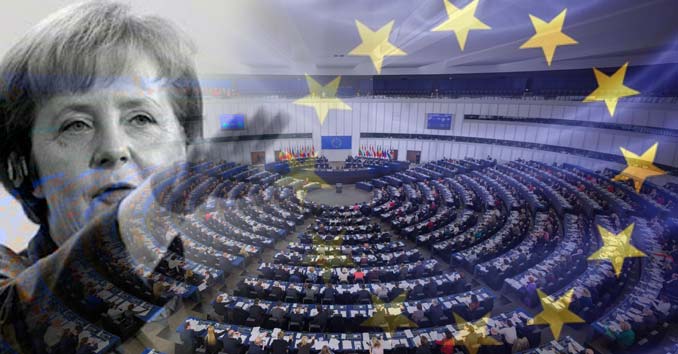( A seven-minute read)
It appears that Theresa May has little or no understanding of the mean of the word Union or for that matter Nato Motto, “animus in consulendo liber”
(A satisfactory translation of the phrase has not been found, although a French version“l’esprit libre dans la consultation” comes close. Renderings in English have ranged from the cryptic “in discussion a free mind” to the more complex “man’s mind ranges unrestrained in counsel.”)
It is complete hogwash to be saying England wants to leave the EU’s common foreign and security policy as early as next year but would show flexibility around the UK’s red lines to secure a new security treaty. Dropping out of the single market and refusing to adhere to judgments of the European court of justice (ECJ) means the country would no longer be able to participate in joint institutions such as Europol, EU police databases or EU military missions.
So would someone please explain to me what she means when she says ” participated in EU agencies while also having its “sovereign legal order.”
If you are no longer in Europol and you have ditched the EU’s common foreign and security policy how can you “respect the role of the European court of justice”
On the other hand it seems to me that all the talk about a European Army/Security and its joint headquarters is another attempt to set up a new bureaucratic structure in order that European officials can continue to exist in comfort, producing paperwork and public declarations, just as they do in the EU and the Council of Europe’s Parliamentary Assembly (PACE).
Many Europeans have argued that the members of the European Union can exert greater influence in the world if they act together rather than separately; and that following the decline of Europe’s major powers, individual states’ power can collectively create a more powerful and credible European voice on the world stage.
The EU rarely manages to speak with one voice in any meaningful way.
There may well be a massive chasm between Europe, England, and US in terms of military capability but the fight against militants needs not more troops, but extensive and professional law enforcement agencies, a wide network of agents and other anti-terrorist structures.
They cannot be an army with rockets, tanks, bombers, and fighters – you do not fight against terrorists with heavy military equipment.
Having a joint court to arbitrate between states is a pragmatic solution to security cooperation.

One way or the other, Europe cannot afford two parallel armies for several reasons. Firstly, even now, a number of states are in no hurry to allocate 2 percent of their GDP to NATO’s overall defense budget, which relies mainly on Washington paying 75 percent of the total. Also, there are not enough human resources for the new army.
Furthermore, in an army, which is based on a unity of command and unquestioning obedience to the commander or boss, there cannot be any independent structures in principle. Otherwise, it is not an army, but a bad collective farm of bewildered soldiers receiving orders in twenty different languages.
So would someone tell me on what principle an integrated European army should be created?
In 2000, the EU announced proposals for an army of 100,000 (60,000 of whom could be deployed at 60 days’ notice for up to a year at a time). Britain’s Conservative Party commented at the time that this would effectively destroy NATO. Either troops already committed to NATO will be counted twice, or, in the worst case scenario, troops will be withdrawn from existing NATO missions.
But if a European army is created all the same, how will Russia react?
The Russians will work with it as they do with NATO. Let us just hope that the relationship will start with a clean slate and become a friendly one.
Sovereignty, however, cannot be traded for influence.
The ability to project power, whether regionally or globally, depends on several factors, including leadership, credibility, military capability, popular support, and dependable allies. The EU lacks all of these qualities.
The EU has no standing army. Instead, under its common security and defense policy (CSDP), it relies on ad hoc forces contributed by EU countries for:
Joint disarmament operations
Humanitarian & rescue tasks
Military advice & assistance
Conflict prevention & peacekeeping
Crisis management, e.g. peacemaking & post-conflict stabilization.
Since the Maastricht Treaty of 1991, the European Union has sought to forge a Common Foreign and Security Policy (CFSP) precisely to take the lead in times of global crises. Since January 2007, the EU has been able to carry out rapid-response operations with 2 concurrent single-battle groups, each comprising 1500 soldiers.
The EU failed to comprehend the sheer complexity of the problems of an EU Army because of its own institutional and military limitations, and the very different historical perspectives and policies of its 12 constituent members.
For example, Austria, Ireland, Finland, Sweden, and Malta have chosen to pursue neutrality. It is highly improbable that these countries which don’t even belong to NATO will enroll their citizens in a European military alliance.
Article 42 of the Lisbon Treaty clear STATES that any further co-operation in the area of defense should be consistent with Nato commitments.
Even though terrorism is a serious issue, centralizing security and defense policies on the European level isn’t a useful way of fighting such a diffused and complex threat. If a Foreign policy is an attribute of statehood that must remain at the nation-state level if it is to be meaningful or effective.
Is it not pathetic to witness Mrs. May linking an economic deal to crime-fighting measures and to the sharing of intelligence.
It’s like a naughty school child sharing a secret for a smartie.
Without group security goals, building a common defense policy is neither realistic nor useful.

All human comments appreciated. All like clicks chucked in the bin.
